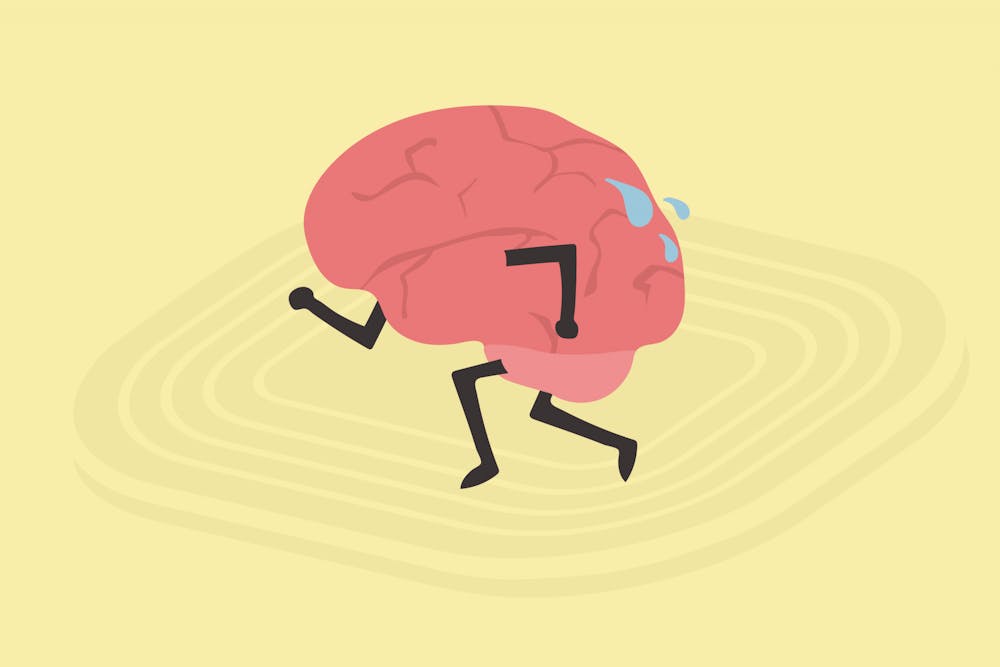The cult mentality of American football is like no other. Shockwaves rippled through the sports world recently when Philadelphia Eagles player Lane Johnson opened up about his struggles with depression and anxiety—but this is just one instance in a larger trend of mental health struggles faced by professional athletes.
Professional football players meet a unique set of challenges—an intense pressure to perform, a pervasive culture of toxic masculinity, and a rigid schedule that can easily lead to overexertion. Football players are also more prone to injuries, which can cause severe mental health strain. A 2017 study found that severely injured football players were nearly two to seven times more likely than non–injured players to develop symptoms of mental health problems. Many athletes also suffer from brain injuries due to the high rate of concussions from football games. Chronic traumatic encephalopathy (CTE), a degenerative brain disease caused by repeated head trauma, causes individuals to become more prone to mental illness, and has been found in the brains of more than 315 football players.
However, football players often lack the support needed for both mental and physical recovery. Players are rarely given a game schedule that permits time for leisure, relaxation, or self–care. Furthermore, physicians for sports injuries have been ineffective at educating athletes about coping with injury and facilitating access to psychological support services. Football players recovering from injury are also typically expected to immediately return to practice, and are not given any long–term tools to psychologically cope with their injuries.
Although players like Kevin Love, A.J. Brown, Lane Johnson, Calvin Ridley, and many others have shared their experiences with mental illness, the stigma surrounding mental health remains. Football players like Solomon Thomas of the Las Vegas Raiders, DJ Chark of the Jacksonville Jaguars, and countless others have said they fear being perceived as weak or incapable when opening up about their mental health—whether this would mean losing fans or losing the respect of their coaches and teammates.
Recognizing that this is a widespread problem—including on college campuses—Penn has taken some measures to account for the mental health of its student–athletes. The Mental Health and Performance Department of Penn Athletics has partnered with Counseling and Psychological Services (CAPS) and the Center for Student–Athlete Success (CSAS) to prioritize student-athletes with mental health concerns. Each team at Penn also has a specialized mental performance liaison.
In addition to meeting with academic advisors, Penn student–athletes are given access to meetings with a sports psychologist. Joel Fish—a psychologist who has worked with teams like the Philadelphia Flyers and Philadelphia 76ers, among others—is a notable resource for the Penn football team. Fish meets with the players at the end of each practice to conduct group discussions about coping mechanisms for anxiety, self–esteem, and time management as student–athletes. He also reaches out to players individually to discuss their personal headspace, and offers athletes the option to contact him.
But there’s much more that Penn can and should do to take care of its athletes. While Penn facilitates workshops about wellness, it doesn’t specifically address the broader challenges that football players face: rigid norms of toxic masculinity in football, burnout, and the constant pressure to perform, to name only a few. Penn has also hired a single sports psychologist for all of their athletic teams, making it impossible for every student–athlete to receive the help and resources they need.
Penn could also learn a thing or two from other colleges. For instance, the University of Southern California is home to the largest sports psychology team in the nation, one which reflects the diverse backgrounds of its student–athletes. USC has instructed its sports psychologists to hold team meetings to discuss team dynamics and performance, as well as educate coaches and players about depression, anxiety, suicide prevention, substance use, body image, eating disorders, healthy relationships and the psychological effects of an injury.
Ultimately, more funds should be allotted, more services provided, and more consideration given to taking care of the mental health of student–athletes. As mental health remains an ongoing issue for both professional football players and student–athletes, it's imperative that Penn recognizes that its players have needs, and struggles which can be amplified in high–pressure environments, whether that's in the classroom or on the playing field.

